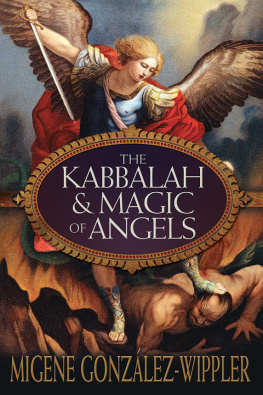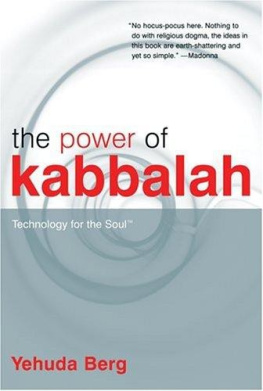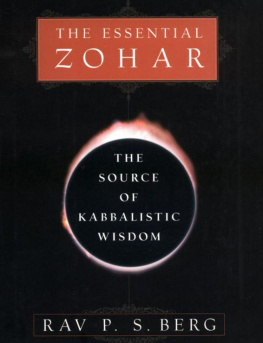Kabbalah
for the
Layman
 2012 Kabbalah Centre International, Inc.
2012 Kabbalah Centre International, Inc.
All rights reserved. No part of this publication may be reproduced or transmitted in any form or by any means, electronic or mechanical, including photocopying, recording, or by any information storage and retrieval system, without permission in writing from the publisher, except by a reviewer who wishes to quote brief passages in connection with a review written for inclusion in a magazine, newspaper, or broadcast.
Kabbalah Publishing is a registered DBA of The Kabbalah Centre International, Inc.
For further information:
The Kabbalah Centre
155 E. 48th St., New York, NY 10017
1062 S. Robertson Blvd., Los Angeles, CA 90035
1.800.Kabbalah www.kabbalah.com
First Edition, February 2012
ISBN: 978-1-57189-783-1
Design: HL Design (Hyun Min Lee) www.hldesignco.com

Table of Contents
I t is of the utmost importance that the reader strives to achieve a clear understanding and comprehension of the basic concepts and terminology of Kabbalah as a foundation for more advanced studies. The reader is urged to read carefully the section on The Main Teachings (Chapter 8); without it the terms and concepts used in the text may be misleading. An inclusive glossary has also been provided at the back of the book for further guidance.
It may seem, on occasion, as though definitions and explanations are repeated, but successive readings of the book will reveal increasingly profound levels of meaning as the essential unity of the teachings of Kabbalah becomes apparent.
F or a long time Kabbalah has remained virtually inaccessible to the average person: Its study has been restricted either to the more Orthodox sects of Judaism or to academic scholars. Orthodox Judaism has always stressed the prime importance of Talmudic studies, viewing Kabbalah as suitable only for those who are already knowledgeable in Talmud and Mishnah, and who have reached an age when they can cope with the secrets of esoteric wisdom. The academic world, on the other hand, sees in Kabbalah the ideal field for research, complete with abstruse texts, colorful personalities and masses of symbolism to be collected, collated and set down in numerous papers. Neither Orthodox Judaism nor the field of academia makes a recognizable attempt to treat the vast literature of Kabbalah as a living and viable system of thought. As a result, little effort has been made to present the material gleaned from research in a format that could be understood by the vast majority of people who lack any specialized knowledge on the subject. The ordinary person who wants to find out more about the nature and content of the study of Kabbalah will find himself facing difficulties. If he approaches religious figures, he will inevitably be discouragedeither because of the widespread ignorance that exists within religious circles about Kabbalah, or by the stringency of the qualifications that will be demanded before he can undertake even preliminary investigations.
The result of this disregard of Kabbalahwhich, as we shall see, signifies a lack of understanding of the position held by Kabbalah on the Torah (Bible)can be seen in the all-too-frequent degeneration of religion into an insignificant social activity, and in the flight of young people away from religion to the more mystically-inclined eastern religions.
The purpose of this book, therefore, is not just to provide the reader with a taste of the vast world of mystical thought and an experience of how Kabbalah can be brought to bear on the problems facing the world today, but to argue the appropriateness and necessity of returning to the study of the universe and its law that is provided for us by Kabbalah.
There can be no doubt that the recent interest in mysticism among the young has given an important impetus to the resurgence of Kabbalah as a living force in spiritual studies. It has come as a surprise to many to discover the existence of such a full-fledged, complex and absorbing system as Kabbalaha system, that can deal intelligently with all the problems thrown up by existence in the twentieth century. Religion is frequently experienced by young people as an arbitrary and archaic system of coercive and restrictive rules, fossilized through the arrangements of the sages until the result would seem of more interest to the historian and the archaeologist than to the person facing the problems of finding out what it means to be spiritual in a modern society.
How refreshing, then, to discover Kabbalah. Here we find that all forms of coercion are finally ruled out. It is pointed out that the Almighty, who created each and every one of us, does not force us to do good. How then, can we justify the use of force and threats to compel one another to certain forms of behavior? According to Kabbalah, no precept should be fulfilled merely in the name of tradition or commemoration, without a deeper understanding of the reasons underlying that precept. The only reason to observe a precept is that by using the understanding of Kabbalah together with the tools and instruments provided for our use by the Bible, one can reconstruct the mystical dimension of a time lost in the past, a time whose energies continue to exist in the universe. These meta-physical energies, which Kabbalah describes in detail, are available for our use each and every day, provided we know how to draw them down and to what use we can put them.
Rav Shimon bar Yochai, the author of the Zohar (Book of Splendor), the classic work on the hidden understanding of the Bible, made exactly this point in his refutation that religious obligation is a sufficient reason for ritual and the fulfillment of precepts. Prayer and ritual, devoid of meaning and spirituality, are like strawthe epitome of lifelessness. If religion is not seen as a force in our society, the cause may lie in its current inability to meet the growing spiritual needs of its adherents.
Closer to our own time we have the observation made by Rav Yehuda Ashlag (1886-1955), who translated the Zohar and its concepts from the original Aramaic into modern Hebrew: If the needs of religious observers are not met, then we may expect a totally de-spiritualized and demoralized society, the likes of which has never been experienced in the history of humankind.
It is becoming increasingly clear that what is needed is a genuine moral and spiritual system that will both enable us to redefine such basic terms as Good and Evil for a generation to whom they have become meaningless, and help us make sense of a universe that now contains space travel, drug addiction, atomic destruction, television and the laser. It is the contention of this book that knowledge of Kabbalah leads one to a true appreciation of the significance of these problems, and provides the key to their eventual mastery.
The widespread ignorance surrounding the nature and content of Kabbalah has led to the growth of false ideas, fear and mistrust; those few Kabbalists in the past who misused their powers, or misinterpreted their role as the bearers of wisdom, have had a detrimental effect on the popular attitude towards Kabbalah that is quite disproportionate to their numbers. In the absence of arguments to the contrary, it is generally believed that the study of Kabbalah is an unnecessary and dangerous pursuit. It is deemed unnecessary because all that a spiritual person needs to know is contained within the Bible and the commentaries and is dangerous in that it threatens not only the balance and sanity of the individual, but also the well-being of the community. In fact, it was precisely for this reason that Rav Shimon bar Yochai made the vital distinction between
Next page





 2012 Kabbalah Centre International, Inc.
2012 Kabbalah Centre International, Inc.